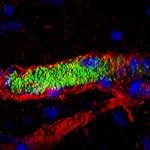Link to Pubmed [PMID] – 34315900
Link to DOI – 10.1038/s41467-021-24797-z
Nat Commun 2021 07; 12(1): 4547
The human pathogen Neisseria meningitidis can cause meningitis and fatal systemic disease. The bacteria colonize blood vessels and rapidly cause vascular damage, despite a neutrophil-rich inflammatory infiltrate. Here, we use a humanized mouse model to show that vascular colonization leads to the recruitment of neutrophils, which partially reduce bacterial burden and vascular damage. This partial effect is due to the ability of bacteria to colonize capillaries, venules and arterioles, as observed in human samples. In venules, potent neutrophil recruitment allows efficient bacterial phagocytosis. In contrast, in infected capillaries and arterioles, adhesion molecules such as E-Selectin are not expressed on the endothelium, and intravascular neutrophil recruitment is minimal. Our results indicate that the colonization of capillaries and arterioles by N. meningitidis creates an intravascular niche that precludes the action of neutrophils, resulting in immune escape and progression of the infection.


